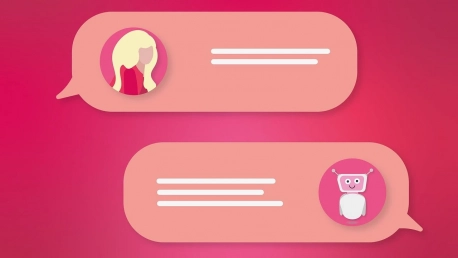The burgeoning field of healthcare technology has seen a significant evolution with the advent of smart wearable devices and artificial intelligence (AI). By integrating AI chatbots with data from wearable medical devices, healthcare is on the cusp of a transformative change. This synthesis not only advances public health and individual care but also promotes early illness detection and creates better communication channels between patients and healthcare providers. The power lies in the synergy between continuous health monitoring from wearables and the sophisticated capabilities of AI chatbots in interpreting data and user interaction, promising a more proactive and informed healthcare environment.
The Role of Wearable Devices in Modern Healthcare
The Life-Saving Potential of Wearables
Wearable devices have emerged as life-saving tools that continuously monitor vital signs and track various health metrics. According to the Organisation for Economic Co-operation and Development (OECD), these innovations could save approximately 1.2 million lives annually through more effective public health interventions. For instance, the Medtronic MiniMed Gold, a wearable that frequently measures blood glucose levels, has become a cornerstone in the management of diabetes. It signals a monumental leap forward by providing patients and physicians with real-time data, which is essential for timely decision-making and therapy adjustment, ultimately preventing severe diabetes complications.
Monitoring Infant Health with Wearables
In pediatric care, wearable technology is breaking new ground. Firstday Healthcare has introduced FDA-approved wireless sensors that actively monitor infants’ health indicators at home. These sensors provide automatic alerts to parents in case of irregularities, such as abnormal breathing patterns or heart rates, enabling rapid response to potential health risks. This continuous monitoring reassures parents and ensures swift medical attention if necessary, underlining the immense value of wearables in managing the health and well-being of the most vulnerable patients.
Advancements in AI Chatbot Technology
NLP and Sentiment Analysis
Recent advancements in AI technology, particularly Natural Language Processing (NLP) and sentiment analysis, have refined the human-like interaction of AI chatbots. NLP allows chatbots to understand and respond to human language with remarkable accuracy, creating a more seamless and natural user experience. Sentiment analysis further equips these chatbots to detect the emotional tone behind user responses, enabling them to offer tailored and empathetic assistance. This level of sophistication strengthens the bridge between machines and humans, fostering trust and improving communication efficacy.
Chatbots as Medical Interpreters and Companions
AI chatbots have taken on the role of medical interpreters, skillfully deciphering data from wearables and Electronic Health Records (EHRs) to deliver insights in understandable language for patients. They also serve as personal health companions by offering empathetic support and reassurance, especially to those who may be apprehensive about accessing healthcare services. By transforming medical jargon into friendly advice, they empower patients with knowledge and confidence to manage their health proactively.
AI Chatbots in Disease Management and Healthcare Access
Managing Chronic Conditions
AI chatbots play an integral role in chronic disease management by continuously analyzing patient data and providing personalized feedback. They can also alert individuals to early signs of diseases like COVID-19, serving as an initial screening tool that has proven to be critical in patient outcomes. By identifying symptoms and suggesting appropriate actions, AI chatbots not only improve disease management but also potentially save lives by recommending timely healthcare interventions.
Encouraging Healthcare Utilization
AI chatbots are pivotal in encouraging underrepresented groups to seek medical care. They provide a friendly and accessible means of communication for individuals who may otherwise be reluctant or unable to access healthcare services. This interactive technology has been instrumental in boosting healthcare referrals by 15%, demonstrating a significant improvement in healthcare utilization and, consequently, better public health outcomes.
Streamlining Healthcare Processes with AI
Preparing for Clinical Assessments
AI chatbots enable healthcare providers to streamline their processes by conducting initial clinical assessments. They gather essential information from patients before the actual visit, allowing clinicians to prepare and focus on the critical aspects during the consultation. This preparation can significantly reduce the time healthcare professionals spend with each patient, optimizing their workflow and maximizing efficiency in patient care.
Reducing Staff Burden
Healthcare providers are often inundated with work, but AI chatbots offer relief by providing 24/7 assistance to patients. They can address common concerns, schedule appointments, and manage routine inquiries, lifting a considerable burden off the shoulders of healthcare staff. This continuous availability allows healthcare systems to operate more smoothly and ensures that patients receive timely support, easing the overall strain on healthcare resources.
Addressing Challenges and Concerns
Knowledge Limitations and Human Oversight
Despite the many advantages of AI chatbots, concerns about their knowledge limitations persist. It is crucial for healthcare providers to supervise and validate the responses given by chatbots to ensure accuracy and reliability. Providers can train these AI systems to align with the latest medical guidelines and research, thereby maintaining chatbot efficacy and upholding medical standards.
Data Privacy and Security Measures
In the digital era, data privacy remains paramount, especially when dealing with sensitive patient information. Ensuring the security of this data is of utmost importance, which is why encryption and other robust measures are in place to protect it. The emergence of HIPAA-compliant AI chatbots represents a step forward in aligning with healthcare data security standards, offering peace of mind to both patients and healthcare professionals.The integration of AI chatbots with wearable device data heralds a new era in healthcare, enhancing patient care and streamlining healthcare operations. Though not a replacement for professional medical advice, their role in early illness detection, patient support, and efficiency improvement is unmistakable. As the healthcare industry continues to adopt these technologies, it moves closer to a future where personalized and responsive care is the norm, benefiting patients and providers alike.









